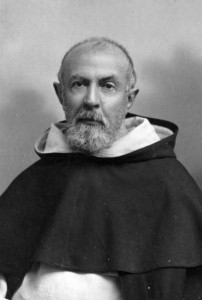 Marie-Joseph Lagrange, one of the founders of the Ecole Biblique, was one of the most important Catholic BIble scholars at the end of the 19th and beginning of the 20th centuries. Today, I came across a lecture he gave on what Catholic biblical exegesis is all about. It’s interesting from a historical perspective since it is before Vatican II and before Divino Afflante Spiritu. Here’s a little excerpt for some flavor:
Marie-Joseph Lagrange, one of the founders of the Ecole Biblique, was one of the most important Catholic BIble scholars at the end of the 19th and beginning of the 20th centuries. Today, I came across a lecture he gave on what Catholic biblical exegesis is all about. It’s interesting from a historical perspective since it is before Vatican II and before Divino Afflante Spiritu. Here’s a little excerpt for some flavor:
H, then, Scripture had been the only
means to assure the preservation of a doctrine
which is much richer than the ” weak and needy
elements ” of the old Law, God would have
provided very poorly for its preservation. The
answer of tradition is more complete and more
precise. The New Testament contains neither
a creed nor a sacramentary. And doctrine is
preserved in the Church as an ever living and
acting faith.Precisely ! it will be said. This faith lives,
consequently it evolves, hke all human things.
With time it will give to the questions put before
it answers more complete and more precise.Granted, but this development is not a deformation.
The Church, in virtue of a supernatural
logic, which is at the same time perfectly rational,regards the truth, which she has received from
God Himself, as having an immutable character,
and she is intent on transmitting it just as she
received it in its substantial elements.
But do not forget that we are deahng here with
this question of the development of doctrine only
from the viewpoint of the exegete. The difficulty
that is urged regards only the sincerity of interpretation.
It may be thought that the exegesis of the
Church, being imposed upon her by her dogma,
will lack sincerity since it will lack hberty. The
objection does not apply to Cathohc exegesis.
The danger it calls attention to may exist only for
a society which has no other rule of faith than
the Bible, and is bound to find therein all the
truths which it professes. But such is not the
case with the Church. Why should she torture
texts to get from them what she can get from
tradition? A Cathohc may and must beheve in
dogma not enunciated in Scripture, as, for instance,
in the perpetual virginity of Mary. He
is not, then, obhged to have recourse to any
violent form of exegesis. The texts remain undisturbed. (pp. 38-39)
You can get the whole text of his lecture on “The Exegesis of the Catholic Church” in a 1920 translation in a book called “The Meaning of Christianity” on archive.org. Happy reading!
